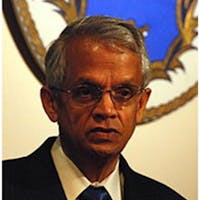Bio
Dr. Veerabhadran Ramanathan is a Distinguished Professor at the Scripps Institution of Oceanography, UC San Diego. In the 1970s, he discovered the greenhouse effect of CFCs and numerous other manmade trace gases, and forecasted in 1980, along with R. Madden, that the global warming would be detectable by the year 2000.
He, along with Paul Crutzen, led an international team that first discovered the widespread Atmospheric Brown Clouds (ABCs). Dr. Ramanathan showed that ABCs led to large scale dimming, decreased monsoon rainfall and rice harvest in India and played a dominant role in melting of the Himalayan glaciers. He has also estimated that reduction of black carbon can reduce global warming significantly and is following this up with a climate mitigation Project Surya which will reduce soot emissions from bio-fuel cooking in rural India.
Recently, he chaired a National Academy report that calls for a major restructuring of the Climate Change Science Program and it was received favorably by the Obama administration. His numerous awards include the 2009 Tyler prize, the Volvo Prize, the Zayed prize, the Rossby Medal and the Buys-Ballot Medal for pioneering studies in climate and environment. He has been elected to the American Philosophical Society, the US National Academy of Sciences, the Pontifical Academy by Pope John Paul II and the Royal Swedish Academy of Sciences.











